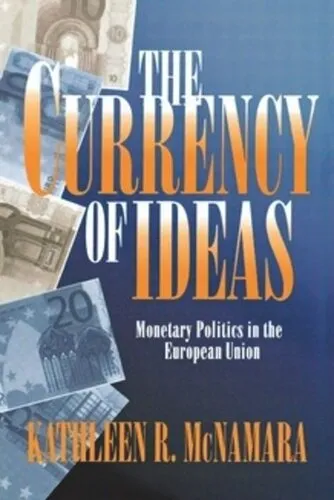The Currency of Ideas: Monetary Politics in the European Union
4.3
Reviews from our users

You Can Ask your questions from this book's AI after Login
Each download or ask from book AI costs 2 points. To earn more free points, please visit the Points Guide Page and complete some valuable actions.Introduction to "The Currency of Ideas: Monetary Politics in the European Union"
Published in 1998, The Currency of Ideas by Kathleen R. McNamara offers a compelling and intellectually rigorous analysis of the role of ideas in shaping the political and economic integration of Europe through monetary union. The book delves deep into the development of the European Monetary Union (EMU), examining how ideas, ideologies, and symbols influenced critical policy decisions, the construction of institutions, and the integration process as a whole.
By challenging the conventional wisdom that economic policies primarily stem from material interests or power dynamics, McNamara underscores the importance of shared beliefs, intellectual paradigms, and cultural frameworks as integral forces in shaping institutional pathways. Through rich historical and political analysis, the book explores the origins of the euro and traces the broader implications of monetary politics in the European Union (EU). It remains a foundational text for anyone seeking to understand how currency unification played a pivotal role in the EU’s evolution, balancing economic imperatives with political ideologies.
Detailed Summary of the Book
"The Currency of Ideas" emphasizes that the European Monetary Union is far more than a technical economic project; it is a product of ideational and social foundations shaped by both historical context and strategic policymaking.
McNamara begins by questioning the dominant realist and economic rationalist perspectives on EU integration. She argues that these explanations neglect the significant role of shared ideas and institutionalized beliefs in framing how actors define their priorities and the choices available to them. Central to the book is an investigation into the process that led to the establishment of the euro, marking a leap of faith toward deeper integration despite skepticism and economic risks.
The analysis centers on two primary themes:
- The Role of Ideational Frameworks: McNamara shows how the dominant neoliberal economic philosophy of the 1980s and 1990s, emphasizing low inflation, fiscal discipline, and market integration, became deeply institutionalized in EU policy debates. This ideational framework provided policymakers with a coherent rationale to advocate for monetary union, despite varying national interests.
- Historical Contingency and Symbolism: The book examines how symbols of collective identity and historical narratives shaped public and elite support for the euro. Ideas about national sovereignty, European unity, and modernity all converged to position the euro as both a practical and symbolic achievement.
Through these themes, McNamara provides a nuanced understanding of how and why European states chose to relinquish significant aspects of their monetary sovereignty in pursuit of a collective project with profound political and economic implications.
Key Takeaways
- Ideas Drive Policy: The book demonstrates that ideational factors—such as prevailing economic theories and shared visions of European integration—play a crucial role in shaping policy decisions and institutional developments.
- The Significance of Symbolism: European leaders successfully used the euro as a symbol of unity and progress, fostering a sense of shared purpose that transcended purely economic calculations.
- Institutional Path Dependency: Once specific ideas or policies are embedded in institutional frameworks, they influence subsequent decisions and make alternative pathways less viable.
- Integration Beyond Material Interests: While economic benefits and power politics matter, McNamara shows that EU integration cannot be fully explained without accounting for ideational and sociocultural factors.
- Challenges to Sovereignty: The European Monetary Union represents a significant transfer of sovereignty, illustrating the tension between national autonomy and collective European governance.
Famous Quotes from the Book
"The pursuit of the European Monetary Union was not merely an economic strategy but a profoundly political and ideational project, shaped by shared visions of a united Europe."
"Ideas do not simply reflect material interests; they actively construct the frameworks within which interests are understood."
"Monetary union became not just an economic necessity but a symbol of European modernity and collective destiny."
Why This Book Matters
Understanding monetary politics in the EU is essential, not only for scholars of political science and international relations but also for policymakers and anyone interested in the dynamics of global governance. McNamara's The Currency of Ideas provides key insights into how ideational factors and social constructions influence decision-making processes even in highly technical arenas such as monetary policy.
The book bridges the gap between economic theory and political science, offering a model of analysis that accounts for the complex interplay of ideas, institutions, and power. It challenges economistic approaches to monetary union and instead invites readers to consider the broader cultural, historical, and political contexts of integration. This interdisciplinary perspective makes McNamara's work not only relevant to debates about European integration but also applicable to other contexts where ideas shape policy outcomes and institutional structures.
In an era when debates over the future of the EU remain as polarized as ever, The Currency of Ideas continues to resonate as a seminal work that sparks thoughtful analysis about the balance of sovereignty, unity, and ideational power in collective projects.
Free Direct Download
Get Free Access to Download this and other Thousands of Books (Join Now)
For read this book you need PDF Reader Software like Foxit Reader


